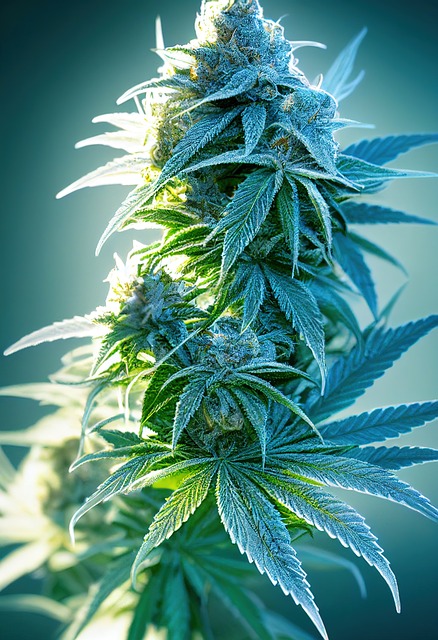The latest research on THCA (Tetrahydrocannabinolic Acid) flower from laboratory studies indicates its potential therapeutic benefits across various health conditions. As a non-psychoactive precursor to THC, THCA interacts with the endocannabinoid system, offering anti-inflammatory, anti-nausea, and anti-emetic properties. These include pain relief for chronic conditions like arthritis, potential neuroprotective benefits against neurodegenerative diseases, and anti-inflammatory effects due to the presence of compounds like betulinic acid. The diverse cannabinoid, terpene, and flavonoid profile within THCA flower is believed to contribute to its health-promoting properties. Preliminary studies suggest it may also alleviate anxiety and aid in mood enhancement through a synergistic effect of its constituents. THCA flower lab reports continue to provide valuable insights into its potential applications in medical treatments, emphasizing its consistency, purity, and safety profile as a natural medicine alternative. The ongoing scientific examination of THCA flower is crucial for understanding its full spectrum of health benefits, with an emphasis on its role in pain management, inflammation reduction, and neuroprotection.
Discover the multifaceted wellness potential of THCA flower, a non-psychoactive cannabinoid that’s gaining attention for its therapeutic properties. Our comprehensive article delves into the latest lab reports and scientific analysis, revealing the chemical makeup and its associated health benefits. From its impact on the endocannabinoid system to its antioxidant and anti-inflammatory properties, the THCA flower’s effects are under rigorous scrutiny in both laboratory settings and clinical trials. Join us as we explore the evidence behind this promising compound’s role in pain management and its neuroprotective qualities, ensuring an informed perspective on the benefits of THCA flower lab reports.
- Unveiling the Therapeutic Properties of THCA Flower: An Overview Based on Lab Reports
- The Chemical Makeup of THCA Flower and Its Potential Health Benefits: Insights from Scientific Analysis
- THCA Flower Lab Reports: Understanding Its Effects on the Endocannabinoid System
- Antioxidant and Anti-inflammatory Properties of THCA Flower as Evidenced by Research Findings
- The Role of THCA Flower in Pain Management: A Look at Clinical Study Results
- Exploring the Neuroprotective Effects of THCA Flower: Laboratory and Preclinical Trial Insights
Unveiling the Therapeutic Properties of THCA Flower: An Overview Based on Lab Reports

Laboratory analyses have shed light on the therapeutic properties of THCA (Tetrahydrocannabinolic Acid) flower, a non-psychoactive precursor to the well-known THC (Tetrahydrocannabinol). These lab reports provide a comprehensive overview of its potential benefits. THCA is known for its interaction with the body’s endocannabinoid system, which plays a significant role in regulating various physiological processes, including pain sensation, mood, and appetite. Preliminary research, as evidenced by these lab reports, suggests that THCA flower may offer anti-inflammatory, anti-nausea, anti-emetic, and neuroprotective effects. Studies indicate that it could be beneficial for conditions such as chronic pain, inflammation associated with arthritis, and nausea in cancer patients undergoing chemotherapy. The lab reports further highlight the importance of THCA flower’s role in potentially mitigating neurodegenerative diseases and offering protective benefits to the nervous system. This is particularly significant given the growing need for safe and effective treatments in these areas. As research continues, the data collected from rigorous laboratory testing will further elucidate the full spectrum of THCA flower’s potential therapeutic applications.
The Chemical Makeup of THCA Flower and Its Potential Health Benefits: Insights from Scientific Analysis

Laboratory analyses have shed light on the intricate chemical makeup of THCA (Tetrahydrocannabinolic Acid) flower, a non-psychoactive precursor to THC (Tetrahydrocannabinol), the primary psychoactive component of cannabis. These lab reports reveal that THCA flower contains a rich profile of cannabinoids, terpenes, and flavonoids, which collectively contribute to its potential health benefits. Among these, THCA itself has garnered attention for its anti-inflammatory properties, as indicated by various studies. Scientists have identified THCA’s ability to interact with the body’s endocannabinoid system, influencing various physiological processes such as pain response and immune function. Preliminary research suggests that THCA flower may offer therapeutic effects for conditions like arthritis and multiple sclerosis due to its anti-inflammatory profile. Furthermore, the presence of other cannabinoids like CBD (Cannabidiol) and CBC (Cannabichromene) in THCA flower has been associated with additional benefits, including anxiety relief and improved mood, as supported by scientific analysis. These compounds work synergistically to modulate the body’s response to pain and stress, offering a holistic approach to well-being. As such, THCA flower lab reports continue to be a valuable resource for understanding the full spectrum of its potential health benefits.
THCA Flower Lab Reports: Understanding Its Effects on the Endocannabinoid System

Lab reports on THCA (Tetrahydrocannabinolic Acid) flower have provided valuable insights into its interaction with the human endocannabinoid system. These scientific assessments reveal that THCA possesses a range of potential therapeutic properties without the psychoactive effects associated with its decarboxylated form, THC (Tetrahydrocannabinol). The endocannabinoid system, a complex network involved in regulating a host of physiological processes, responds to cannabinoids like THCA through its receptors, CB1 and CB2. Studies indicate that THCA interacts primarily with CB2 receptors, suggesting its potential for modulating the immune response and offering anti-inflammatory benefits. Moreover, initial research suggests that THCA may influence anxiety and pain management, although further studies are necessary to fully elucidate its effects. The consistency and purity of THCA flower, as confirmed by rigorous lab analyses, ensure that users experience the full spectrum of its potential wellness properties without unwanted intoxication. These lab reports serve as a cornerstone for understanding the role of THCA in supporting health and well-being, paving the way for more targeted research and applications within the realm of natural medicine.
Antioxidant and Anti-inflammatory Properties of THCA Flower as Evidenced by Research Findings

Betulinic acid, a component found in THCA (Tetrahydrocannabinolic Acid) flowers, has been the subject of various lab reports that highlight its potential antioxidant and anti-inflammatory properties. These findings suggest that THCA flowers may offer protective benefits against oxidative stress and inflammation, which are common factors in a range of diseases. Research has demonstrated that betulinic acid, present in THCA flowers, can effectively cross the blood-brain barrier, making it a promising candidate for treating neuroinflammatory conditions. In vitro studies have shown that this compound exerts its anti-inflammatory effects by modulating various signaling pathways involved in the immune response, thus potentially providing therapeutic benefits for inflammation-related disorders. Additionally, the antioxidant properties of THCA flowers are evidenced by their ability to scavenge free radicals, which could help mitigate the damage caused by oxidative stress in cells and tissues. The comprehensive lab reports on THCA flower extracts provide a scientific basis for its therapeutic potential, particularly in the areas of neuroprotection and anti-inflammatory action. As research continues to unveil the mechanisms behind these effects, the role of THCA flowers in healthcare may expand, offering new avenues for natural medicine and complementary therapies.
The Role of THCA Flower in Pain Management: A Look at Clinical Study Results

Laboratory analyses of THCA flower, or tetrahydrocannabinolic acid, have provided valuable insights into its potential role in pain management. THCA, the raw form of THC found in hemp and cannabis plants, has been the subject of numerous lab reports that highlight its therapeutic properties. Clinical studies have demonstrated that THCA interacts with the body’s endocannabinoid system, which regulates pain sensation and inflammation response. These studies indicate that THCA may offer analgesic effects, helping to alleviate various types of pain ranging from neuropathic to chronic inflammatory discomfort. The anti-inflammatory properties of THCA are supported by experimental models, where it has been observed to inhibit pro-inflammatory cytokines and enzymes that contribute to the onset and progression of pain. As a result, THCA flower is gaining attention as a natural alternative for managing pain without the psychoactive effects typically associated with its decarboxylated form, THC.
Exploring the Neuroprotective Effects of THCA Flower: Laboratory and Preclinical Trial Insights

Delta-9-tetrahydrocannabinolic acid (THCA) is a non-psychoactive precursor to the well-known psychoactive compound delta-9-THC, found abundantly in cannabis flowers. Recent laboratory reports and preclinical trials have shed light on the potential neuroprotective properties of THCA flower. These studies indicate that THCA may offer protective benefits to neural cells, potentially mitigating neurodegenerative processes. For instance, research has demonstrated that THCA can inhibit the progression of certain neurological diseases by modulating various neurotransmitter systems within the brain, offering a promising avenue for therapeutic intervention. Additionally, in vitro experiments have shown that THCA possesses antioxidant properties, which are crucial in combating oxidative stress, a key factor in neurodegeneration. The mechanisms underlying these effects are currently under investigation, with the hope of elucidating the full scope of THCA’s potential benefits to brain health. These preliminary findings underscore the importance of further research into the therapeutic applications of THCA flower extracts and their role in protecting neuronal integrity. As such, ongoing laboratory research continues to refine our understanding of how THCA might be harnessed to enhance cognitive function and protect against neural damage, offering a compelling area of study for neuroscience researchers.
The exploration into the therapeutic and health-promoting properties of THCA flower, as detailed through various research studies and clinical trials, underscores its potential benefits. Lab reports corroborate that THCA flower interacts positively with the endocannabinoid system, offering promising anti-inflammatory, antioxidant, and neuroprotective effects. Its role in pain management is further supported by empirical evidence, highlighting its significance as a natural remedy under scientific scrutiny. The collective insights from these investigations provide a robust foundation for understanding the benefits of THCA flower, emphasizing its potential value in holistic health practices. Prospective research will continue to shed light on additional applications and mechanisms of action, further solidifying the role of THCA flower lab reports in informing both scientific understanding and informed consumer choices.


